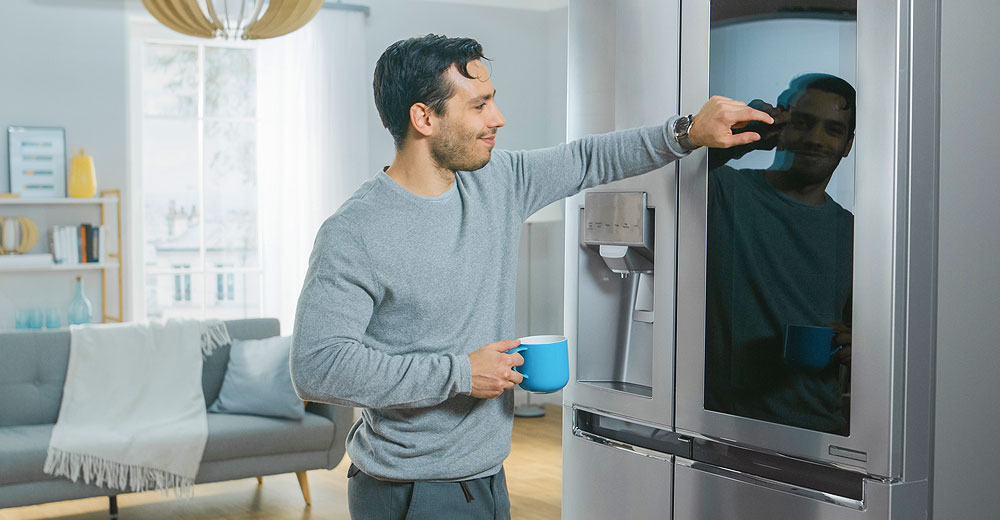Amazon is reportedly developing a smart refrigerator that will automatically keep track of low-stock or expired items and make restock orders.
The fridge uses technology Amazon developed for its cashierless stores, according to Business Insider.
BI noted that the fridge will be able to automatically notify its owner when they’re running low on repeat-purchase items, such as eggs and milk, or if the items are near their expiration dates.
It added that the fridge also makes replenishing items easier through Amazon’s delivery service, Fresh, or its grocery chain Whole Foods.
The fridge may also be able to make recipe suggestions for items that are getting old in the ice box, BI noted.
It also reported that Amazon is looking for a manufacturing partner for the fridge and has already held high-level talks with some large consumer electronic brands about it.
Amazon has been working on the fridge project for two years at a cost of US$50 million a year, BI added.
Grocery Market Share Prize
“All the major refrigerator brands want to have a replenish feature, where consumers can have their products automatically replaced, but it requires a heavy investment in technology,” observed Patrice Samuels, a senior analyst with Parks Associates of Addison, Texas, a market research and consulting company specializing in consumer technology products.
“Amazon is already in an adjacent market in this area,” she told TechNewsWorld. “Some dishwashers will automatically use Amazon Dash to order detergent when they’re running low.”
“Amazon has always played a role in the ecosystem of replenishment for appliances,” she added. “The fact that it’s building its own appliance now with replenish capabilities is going to impact this market and give them a competitive edge.”
“Amazon is locked in a battle with Walmart over which of them will gain or lose market share in the grocery market, which is a huge market in the U.S.,” said Ross Rubin, the principal analyst with Reticle Research, a consumer technology advisory firm in New York City.
“That is a prize that Amazon is eyeing,” he told TechNewsWorld.
Nice Portfolio Fit
Jonathan Collins, a research director at ABI Research, maintained that the fridge is an extension of Amazon’s smart home strategy, which seeks to understand its customer preferences as accurately as possible and then leverage that to be the first and obvious retailer to deliver on those preferences with a range of products and services from Amazon and its partners.
“The ability for a fridge to understand home grocery inventory levels is a more fine-grained extension of the kind of ‘Buy it Again’ features that Amazon already routinely offers its customers,” he told TechNewsWorld.
“In a way, it’s tapping into some of the same demand that meal delivery services cater to,” added Rubin.
Adam Wright, IDC’s senior research analyst for the smart home, explained that a fridge fits nicely into Amazon’s smart home portfolio.
“For a long time, Amazon has steadily been branching out into a wide scope of smart home devices and services — starting with smart speakers and quickly expanding to home monitoring and security devices, home networking devices, smart plugs, appliances — like microwaves, streaming video entertainment, smart lighting devices, and now thermostats and smart fridges,” he told TechNewsWorld.
“Having an ecosystem of devices is vital for success in the market since each device represents a vehicle for service delivery, and also a critical touchpoint through which users can be shepherded deeper into the vendor’s ecosystem and buy more devices and services,” he said.
“This has genuine benefits for the users too,” he contained, “since they can often have a simpler smart home experience with greater levels of personalization if they choose multiple devices from a single brand.”
Pricing Questions
Although no pricing numbers have been mentioned yet about the fridge, given the advanced technology it will feature, it isn’t likely to be cheap. That may not matter.
“Large appliances are already expensive items to begin with and follow a different sales cycle compared to most other smart home devices,” Wright explained.
“Non-direct-to-consumer channels are also a big driver of large smart appliances, such as home builders and the like,” he added. ” So, for consumers in the market already for a large appliance, the Alexa-enabled fridge isn’t that much of a difference in terms of price, and its features will likely be a big draw for many consumers that are increasingly interested in the benefits and conveniences that smart appliances have to offer.”
Generally, the appliance market is moving away from including connectivity in all but the most expensive model, but Amazon may stray from that strategy, Collins asserted.
“Amazon already showed with its Amazon Basics Alexa Microwave that it isn’t wedded to charging a premium for connected devices — in part because it understands how to draw value from that installed device and not just from the unit price,” he explained.
“That said,” he continued, “appliance purchases are driven by a range of variables from price, to design, to features, to matching suites of products, and Amazon will have to navigate these as well. “
Good Timing
If Amazon introduces a smart fridge, it seems to have chosen a good time to do it.
“Smart appliances are making good headway into the home,” Samuels said. “The adoption rate of large, smart appliances — refrigerators, stoves, washers, dryers — are comparable to smart home devices that are doing well.”
Wright noted that the traction smart appliances have gained in the market has been a recent development.
“For some time, the value of a smart appliance was uncertain for mainstream consumers,” he said, “but the capabilities of these devices are becoming more useful, and vendors have been doing a better job in recent years marketing to consumers and raising awareness of their benefits.”
“The pandemic has had a positive impact on the smart appliance market, and we’ve seen big growth in 2020 and 2021 in both large and small smart appliances,” he continued.
“I suspect some of this is due to many consumers and workers being at home because of the pandemic and are drawn to the idea of the conveniences that smart appliances can deliver,” he concluded.
























































